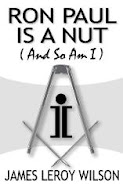I just saw Gone With the Wind tonight. It seems that Rhett Butler was the only man with a lick of sense in the movie, as he knew from the beginning that the war was futile: (to paraphrase: "They have coal mines, factories, and a navy; the South has slaves, cotton, and arrogance.") Butler spends much of the war as a blockade runner.
The women, on the other hand, seem to have a grasp on the benefits of love and life, plus peaceful, honest commerce, such as in these two scenes (the lines are inexact but close):
Scene 1: Outside of Atlanta army hospital, receiving a donation from a madam:
Melanie: Ten, twenty, fifty dollars! And not our paper money, but GOLD!
Scene 2: The front hall of Tara, Scarlett's father comes through the door with news:
Scarlett's father: The Confederacy has surrendered.
Scarlett's sisters: Why did we ever fight?
Melanie, brightening: Ashley's coming back!
Scarlett, also brightening: Ashley's coming back, and we can grow cotton!
Both scenes cracked me up.
* * * *
The previous night, I saw The Fugitive again, though I've seen it lots of times. What makes the movie great is, of course, Tommy Lee Jones's Detective Gerard and the rest of the U.S. Marshals. Yes, it feeds into nationalist propaganda that federal law enforcement must come in to save the day from incompetent local cops. However, there are worse things for the federal government to be doing than finding fugitives wanted for violent crimes who may cross state lines.
* * * *
The night before, I saw, for the second time, most of Miracle, about the 1980 U.S. Hockey team. Coach Herb Brooks, as played by Kurt Russell, almost comes across as an Objectivist hero, without the philosophical pronouncements. He seems indifferent to the political and economic problems in Cold War America, and seems focused on beating the Soviets simply because it is a tremendous challenge, he's convinced he knows how it could be done, and he insists on doing it his way. As a result, he and his team probably did more to win the Cold War than hundreds of politicians, generals, and economists did the time, because Team USA helped change the cultural dynamics in America, restoring the country's self-confidence.
* * * *
Finally, the night before that, I saw Little Big Man for the first time in a long time. Perhaps the most thoroughly negative portrait of the U.S Cavalry ever caught on film, it showed what warriors are capable of when they don't recognize the humanity in the women and children they slaughter.
Another interesting realization came to me from how Chief Dan George refers to his Cheyenne tribe as "the human beings." He did not mean that others, whether Pawnee, white, or "black white men" were of another species, but rather, perhaps, less-than-fully-developed morally and ethically. Don't most tribes and nations have a word describing themselves the same way, saying "we are the real humans" or "the true race" or something like that?
So anyway, this reminds me of the Book of Genesis. I think it's ridiculous that people these days believe that when it says "God made the heavens and the earth" that the writer meant "the galaxies and the planet earth" rather than merely something along the lines of "the sky and the ground." The creation story may begin at the end of the last Ice Age, in which the "waters" - ice, covered the ground and the sky may have been dark from volcanic ash before "light" finally breaks through. Likewise, what was meant by God making the first man, Adam, was probably not that Adam was the first of the biological species homo sapiens and the father of all, leading to questions like "Did Cain marry his sister?" Rather, my guess is that a biological history was the furthest thing from the writer's mind; of course there were others of the same species around, but not possessing the same spiritual inheritance that made Adam the first "human being" in the sense Chief Dan George uses the term.
This is not to say that Genesis is true or false, but its factualness is more convincing if we don't translate the words literally into today's meanings.
James Leroy Wilson's one-man magazine.
Subscribe to:
Post Comments (Atom)




No comments:
Post a Comment